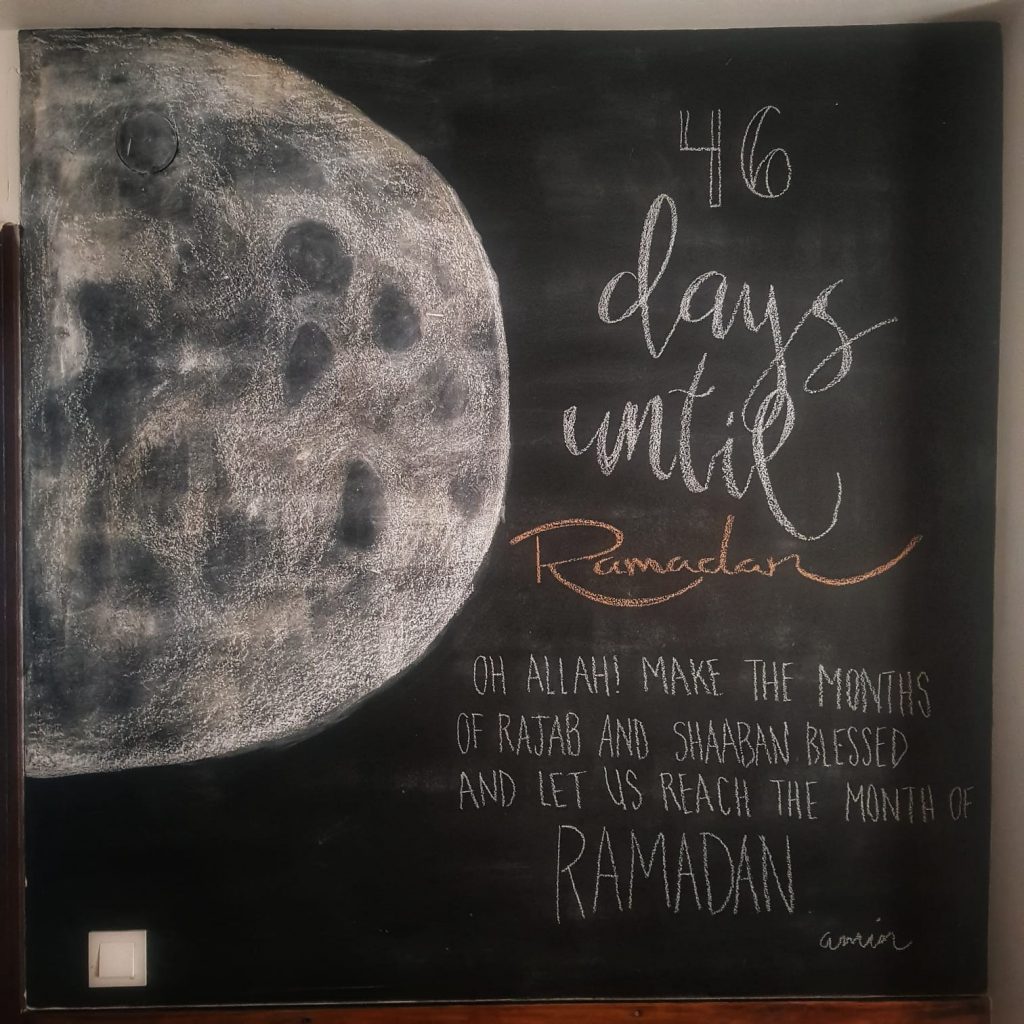
At the end of this weekend there will be 46 days left until Ramadan. I’m sure I am not the only one who looks forward to the blessed month. There are so many feelings of anticipation and hope as the month approaches. After all, the month is an opportunity to renew our relationship with Allah and our faith. It is a chance to have our sins forgiven. For many of us, we depend on the month to spiritually rejuvenate us for the whole year.
Scholars say that one of the signs that Allah has accepted our Ramadan is that we continue to perform the deeds that we established during Ramadan, after the month ends. Of course, the deeds may not continue to the same degree, but they continue nevertheless. (Instead of reading a Juz a day, reading at least some Quran daily, instead of praying the tarawih prayer start praying night prayer…) In other words, we remain steadfast in our actions. The thing is, experts say it takes 66 days to create a habit. This means that if we fast Ramadan, and the 6 days of Shawwal, we are still a month short of making whatever good behaviours we have started permanent. If we truly want to use Ramadan as a reset for our faith, a way to make us better than we were before, I believe we need to commit to and start the process before Ramadan even begins.
What habits do you want to change? What behaviours would you like to omit? What acts of worship would you like to establish. Take the time now to write a list. Sincerely pray and think about it. Then in the month of Shaaban (30 days before Ramadan) start establishing the habit. Use those 30 days before Ramadan, as the start of the process to change who you are. Make a sincere intention, and commit to the process. Remember Ramadan is a time to empty the stomach but feed the soul. The aim of Ramadan is to stop bad habits, not merely to pause them.
Apart from the preparations we should be making to get ourselves in the mindset of being spiritually ready for Ramadan, there are many practical things that we should be doing to get ourselves ready for the month. These preparations will make a big difference in our ability to succeed and reach our goals.
Firstly, write a physical copy down of your goals for the month and the steps you will take to reach the goals. This includes thinking about the time of day you will dedicate to each action, as well as the action itself. Consistency is key. You are also far more likely to achieve goals that you have recorded and planned for in detail. Print out any Ramadan journals, study guides or any other material that you plan to use for the month. I like to do a daily reflection and have found the materials put out by Yaqeen Institute and Omar Suleiman to be wonderful in past years. Nouman Ali Khan (Bayyinah Institute) also has an excellent annual Ramadan program. Find what/who you like and stick to it.
Next, consider creating a meal plan for the month. Write out what you hope to make each night so you will be able to plan ahead for your grocery shopping as well as food preparation. It saves so much time. Go one step further and prepare as many of those meals in the month before Ramadan. As you cook in the next thirty days, double your recipe and put one meals-worth in the freezer. This way, a major part of your food is already prepared. Just take it out and thaw it. Also consider inviting friends over during the next month and have a meal exchange/preparation day. A day where you each bring a large amount and exchange a serving with each other so every person walks away with multiple dishes they can freeze for the month.
This next suggestion is actually more for the actual month, but it is a practical suggestion so I am including it now. In Canada, one of the most wonderful traditions at large gatherings, is something called a “Potluck”. A potluck is done at any kind of function or gathering. Each family brings one dish to share with others- enough so everyone can have a serving. Often there is a discussion about who will be responsible for the main course, and who for appetizers etc. The result is a meal full of variety, an effort that is shared by all, and responsibility that doesn’t only fall on one person. This last point is the most significant. I remember when I first moved to Turkey, I went to iftars and the host never sat down to eat with her guests. Not to mention she spent the WHOLE day preparing for the meal! I have hosted Potlucks here in Turkey many times. I understand it feels like a strange concept, but in my experience it has been a very welcomed one. Don’t look at it as “not being hospitable”. Look at it as an opportunity to spend more time in worship, or resting to prepare for a night of tarawih, as well as a chance to actually spend time eating with those you have invited. I encourage you to consider this idea when you are hosting, particularly close friends and family whom don’t need to be shy around.
Start reducing your caffeine and sugar intake now. This is a huge one for me. I am a major coffee drinker, and I have horrible headaches from caffeine withdrawal. Slowly start to have less of these two things, to reduce cravings and side effects.
Start to reduce the amount you sleep. Slowly get used to getting up 15 mins earlier, then 30 mins… The more you can make your schedule closer to the one in Ramadan, the easier it will feel in that month.
Consider going to the mosque with some other women in your community, (perhaps a group of women you regularly meet with) and talk to the imam about having toys and a designated space for women with children during Tarawih prayers. Volunteer to find the toys, and ask the Imam to announce this to the congregation in the weeks leading up to Ramadan. This way others can get involved, but more importantly the community will know, the mosque is a space that not only support, but encourages everyone in the family to attend. Unfortunately I have seen so many instances where either guests at an iftar, or as a guest, we forgo going to iftar. I want to encourage us all to commit to going to tarawih prayer. You can still have others over for iftar, but tell them in advance, you plan to attend the tarawih prayer and would love for everyone to go together. Having talked to the imam beforehand and making sure there is an appropriate space makes it even more possible for you to attend. Make the most of the month, and don’t forgo the blessing of tarawih for a big meal.
Make sure you consider what you will do to include your children in the month’s festivities and acts of worship. I may dedicate another blog just to getting “Ramadan Ready with Kids” if people are interested, but I cannot stress enough how important it is to involve our children. Ramadan is one of our pillars. Help your children feel the excitement, help them love and look forward to this month. Decorate, plan activities, spend time teaching them about the month, make journals with them, take them to the mosque, let them help prepare meals…
My last suggestion is to restore relationships that may be hurt or struggling before the month begins. Seek forgiveness from those who have hurt. Approach Ramadan with no ill feelings towards anyone, as well as with the knowledge that you have done your best to make sure nobody has ill feelings towards you. Remember some of us may not even live to see Ramadan. Never assume it is a guarantee. Pray for Allah to soften your heart towards others, and give you the strength necessary to make right any wrongs.
Oh Allah make us all see this Ramadan. Make this the Ramadan that will become a turning point in our lives. Make this the year that we establish new habits in regards to our worship and in regards to our relationship with You. Help us to be steadfast in our actions and to maintain them at the end of the month. Make this Ramadan a means that you forgive all of our sins. Accept all of our efforts and all of the intentions we make. Make us among those who enter into Jannah through the gate called Reyyan, reserved for those who fast for Your sake. Amin.






Yorumlar